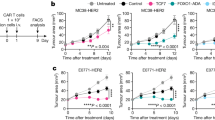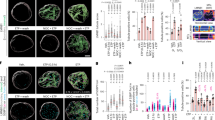Abstract
The tumor suppressor p53 has been implicated in apoptosis induction and is mutated in human T-ALL CCRF-CEM cells. To investigate possible consequences of wild-type p53 loss, we reconstituted CEM-C7H2, a subclone of CCRF-CEM, with a temperature-sensitive p53 allele (p53ts). Stably transfected lines expressed high levels of p53ts and shift to the permissive temperature (32°C) caused rapid induction of p53-regulated genes, such as p21CIP1/WAF1, mdm-2 and bax. This was followed by extensive apoptosis within 24 h to 36 h, supporting the notion that mutational p53 inactivation contributed to the malignant phenotype. p53-dependent apoptosis was preceded by digestion of poly(ADP-ribose) polymerase, a typical target of interleukin-1β-converting enzyme (ICE)-like proteases/caspases, and was markedly resistant to the ICE/caspase-1 and FLICE/caspase-8 inhibitor acetyl - Tyr - Val - Ala - Asp.chloromethylketone (YVAD), but sensitive to the CPP32/caspase-3 inhibitor benzyloxycarbonyl -Asp-Glu-Val- Asp.fluoromethylketone (DEVD) and benzyloxycarbonyl-Val-Ala-Asp.fluoromethylketone (zVAD), a caspase inhibitor with broader specificity. This indicated an essential involvement of caspases, but argued against a significant role of ICE/caspase-1 or FLICE/caspase-8. Actinomycin D or cycloheximide prevented cell death, suggesting that, in this system, p53-induced apoptosis depends upon macromolecule biosynthesis. Introduction of functional p53 into CEM cells enhanced their sensitivity to the DNA-damaging agent doxorubicin, but not to the tubulin-active compound vincristine. Thus, mutational p53 inactivation in ALL might entail relative resistance to DNA-damaging, but not to tubulin-destabilizing, chemotherapy.
This is a preview of subscription content, access via your institution
Access options
Subscribe to this journal
Receive 50 print issues and online access
$259.00 per year
only $5.18 per issue
Buy this article
- Purchase on Springer Link
- Instant access to full article PDF
Prices may be subject to local taxes which are calculated during checkout
Similar content being viewed by others
Author information
Authors and Affiliations
Rights and permissions
About this article
Cite this article
Geley, S., Hartmann, B., Hattmannstorfer, R. et al. p53-induced apoptosis in the human T-ALL cell line CCRF-CEM. Oncogene 15, 2429–2437 (1997). https://doi.org/10.1038/sj.onc.1201399
Received:
Revised:
Accepted:
Issue Date:
DOI: https://doi.org/10.1038/sj.onc.1201399
Keywords
This article is cited by
-
Intrinsic and extrinsic apoptosis responses in leukaemia cells following daunorubicin treatment
BMC Cancer (2021)
-
Polyphenols act synergistically with doxorubicin and etoposide in leukaemia cell lines
Cell Death Discovery (2015)
-
The synthetic glucocorticoids prednisolone and dexamethasone regulate the same genes in acute lymphoblastic leukemia cells
BMC Genomics (2014)
-
Expression, regulation and function of phosphofructo-kinase/fructose-biphosphatases (PFKFBs) in glucocorticoid-induced apoptosis of acute lymphoblastic leukemia cells
BMC Cancer (2010)
-
Repression of the BH3-only molecule PMAIP1/Noxa impairs glucocorticoid sensitivity of acute lymphoblastic leukemia cells
Apoptosis (2009)



